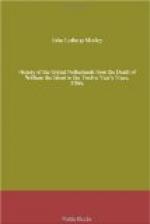From time to time he was enlightened by Sir Francis, who occasionally forced his adversaries’ hands, and who always faithfully informed the Earl of everything he could discover. “We are so greedy of a peace, in respect of the charges of the wars,” he wrote in April, “as in the procuring thereof we weigh neither honour nor safety. Somewhat here is adealing underhand, wherein there is great care taken that I should not be made acquainted withal.” But with all their great care, the conspirators, as it has been seen, were sometimes outwitted by the Secretary, and, when put to the blush, were forced to take him into half-confidence. “Your Lordship may see,” he wrote, after getting possession of Parma’s letter to the Queen, and unravelling Croft’s intrigues, “what effects are wrought by such weak ministers. They that have been the employers of them are ashamed of the matter.”
Unutterable was the amazement, as we have seen, of Bodman and Grafigni when they had suddenly found themselves confronted in Burghley’s private apartments in Greenwich Palace, whither they had been conducted so mysteriously after dark from the secret pavilion—by the grave Secretary of State, whom they had been so anxious to deceive; and great was the embarrassment of Croft and Cobham, and even of the imperturbable Burghley.
And thus patiently did Walsingham pick his course, plummet in hand, through the mists and along the quicksands, and faithfully did he hold out signals to his comrade embarked on the same dangerous voyage. As for the Earl himself, he was shocked at the short-sighted policy of his mistress, mortified by the neglect to which he was exposed, disappointed in his ambitious schemes. Vehemently and judiciously he insisted upon the necessity of vigorous field operations throughout the spring and summer thus frittered away in frivolous negotiations. He was for peace, if a lasting and honourable peace could be procured; but he insisted that the only road tosuch a result was through a “good sharp war.” His troops were mutinous for want of pay, so that he had been obligedto have a few of them executed, although he protested that he would rather have “gone a thousand miles a-foot” than have done so; and he was crippled by his government at exactly the time when his great adversary’s




